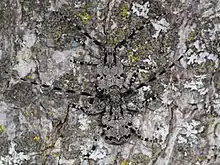Synaphaeta
Synaphaeta is a monotypic beetle genus in the family Cerambycidae first described by Thomson in 1864.[2] Its only species, Synaphaeta guexi (Also called the spotted tree borer), occurs in the Pacific states of North America, from British Columbia down to California.[3] It has been reared from a variety of hardwood trees, including Pacific willow (Salix lasiandra), white alder (Alnus rhombifolia), coffeeberry (Frangula californica), English walnut (Juglans regia), and cherry (Prunus sp.).[4] It was described by John Lawrence LeConte in 1852 based on a specimen from Benicia, California.[1][5]
| Synaphaeta | |
|---|---|
 | |
| Male and female | |
| Scientific classification | |
| Kingdom: | |
| Phylum: | |
| Class: | |
| Order: | |
| Suborder: | |
| Family: | |
| Genus: | Synaphaeta Thomson, 1864 |
| Species: | S. guexi |
| Binomial name | |
| Synaphaeta guexi | |
References
- LeConte, John L. (1852). "An attempt to classify the Longicorn Coleoptera of the part of America North of Mexico". Journal of the Academy of Natural Sciences of Philadelphia. 2 (2): 2 – via Biodiversity Heritage Library.
- " Synaphaeta Thomson, 1864". BioLib.cz. Retrieved November 28, 2018.
- "Synaphaeta guexi (LeConte, 1852)". Global Biodiversity Information Facility. GBIF Secretariat. Retrieved June 6, 2018.
- Tyson, William H. (July 1966). "Notes on Reared Cerambycidae". The Pan-Pacific Entomologist. 42: 201–207 – via Biodiversity Heritage Library.
- "Synaphaeta guexi (LeConte, 1852)". BioLib.cz. Retrieved September 8, 2014.
This article is issued from Wikipedia. The text is licensed under Creative Commons - Attribution - Sharealike. Additional terms may apply for the media files.